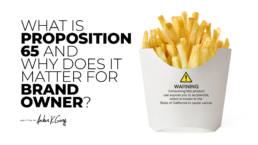If you’re a resident of California, you’ve likely seen a sign or label that reads “WARNING: This product contains chemicals known to the State of California to cause cancer and birth defects or other reproductive harm.” This warning label is required by Proposition 65, also known as the Safe Drinking Water and Toxic Enforcement Act of 1986. But what exactly is Proposition 65 and why does it matter for brand owners? Let’s dive in.
The Basics of Proposition 65
Proposition 65 requires businesses to provide a warning to Californians if their products contain certain chemicals that are known to cause cancer, birth defects, or other reproductive harm. The list of chemicals includes over 900 substances and is updated annually by the California Office of Environmental Health Hazard Assessment (OEHHA).
Businesses can comply with Proposition 65 by either labeling their products with a warning or by removing the chemicals from their products. The warning label must include the name of at least one chemical that is in the product and the message must be clear and reasonable. The warning can be provided on the product label, packaging, or through other means such as a sign at the point of sale.
It’s important to note that Proposition 65 applies not only to products sold in California but also to products that are sold online and shipped to California residents. This means that if you’re a brand owner selling products online, you need to ensure that your products comply with Proposition 65 regulations.
Penalties for Non-Compliance
If a business fails to comply with Proposition 65, it can face hefty penalties. Private citizens and the California Attorney General’s office can bring lawsuits against businesses that violate Proposition 65. The penalties for non-compliance can range from $2,500 to $10,000 per day for each violation.
Not only can non-compliance result in financial penalties, but it can also harm a brand’s reputation. Consumers who see a warning label on a product may think twice before purchasing it, and negative press coverage can damage a brand’s image and credibility.
It’s also worth noting that Proposition 65 lawsuits are often filed against smaller businesses that may not have the resources to fight back. This is why it’s important for brand owners to understand the regulations and ensure that their products comply with Proposition 65.
Steps for Compliance
If you’re a brand owner who sells products in California, there are several steps you can take to ensure that your products comply with Proposition 65:
1. Determine if your products contain any of the listed chemicals: Check the OEHHA website to see if any of the chemicals listed under Proposition 65 are present in your products.
2. Provide a warning if necessary: If your products contain any of the listed chemicals, you must provide a warning to Californians. The warning must be clear and reasonable and can be provided on the product label, packaging, or through other means such as a sign at the point of sale.
3. Consider reformulating your products: If your products contain any of the listed chemicals, consider reformulating your products to remove the chemicals. This can be a costly process, but it may be worth it in the long run to avoid the potential penalties and negative press associated with non-compliance.
4. Keep records: Keep records of your compliance efforts, including any testing or reformulation that you’ve done. This can be helpful in the event of a lawsuit.
Proposition 65 is an important regulation for brand owners to understand, especially if they sell products in California. Non-compliance can result in financial penalties and harm a brand’s reputation, so it’s important to take steps to ensure that your products comply with the regulations. By checking for listed chemicals, providing a warning if necessary, reformulating when possible, and keeping records of compliance efforts, brand owners can avoid the potential pitfalls of Proposition 65 and maintain a positive reputation with consumers.




